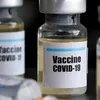COVID: German scientists may know how to prevent vaccine blood clots
Scientists in Germany believe they may have worked out a way to prevent vector-based vaccines from causing rare blood clots.
German scientists believe they have worked out why vector-based vaccines like AstraZeneca and Johnson & Johnson's Janssen cause a rare type of blood clot in some people. And they think they know how to adapt the vaccine to prevent the blood clots from occurring.
Cerebral venous sinus thrombosis (CVST) and splanchnic vein thrombosis (SVT) arising after vaccination have both been associated with thrombocytopenia, a condition where a person has a low blood platelet count.
In a preprint that is yet to be peer-reviewed, the team at Goethe University in Frankfurt said that while scientists have proposed a mechanism to explain vaccine-induced thrombocytopenia, so far there has not been a satisfactory explanation for the blood clots.

Image: Shutterstock
How it works
It starts with the delivery of the gene for the SARS-CoV-2 spike protein. In vector-based vaccines, this is delivered via an adenoviral system, the scientists write.
The SARS-CoV-2 spike gene is then transcribed inside of the nucleus and subsequently exported as mRNA out of the nucleus. Arriving in the cytosol (the liquid contained in cells), the mRNA is again translated into the spike protein.
"And exactly here lies the problem," the scientists write. "The viral piece of DNA — deriving from an RNA virus — is not optimized to be transcribed inside of the nucleus."
In the nucleus, splicing of the spike protein can occur at splice sites.

Representational Image
"But these sites are there by chance because RNA genes are not optimized for gene transcription inside the nucleus," Rolf Marschalek, one of the study authors and a professor at Goethe University, told DW.
"This is the start of the story," said Marschalek "These unintended splice events are destroying the reading frame, resulting then in aberrant proteins being made in the cytosol."
Citing previous research from Greifswald University and a preprint Ulm University, Marschalek said that the scientists think it is a complex mechanism that leads to rare blood clots.
He said that the Greifswald University's findings of the presence of autoantibodies against PF4, Ulm University's preprint on the impurities of the vaccine causing inflammatory situations and Goethe University's findings "together potentially explain these rare events that occur in vaccinated people."
Vaccine could be improved
Marschalek said the vector-based vaccine could be slightly modified to create a splice-safe spike gene which will not allow the production of abnormal proteins.
Based on inspection of the Johnson & Johnson vaccine sequence and the known side effects from the Janssen and AstraZeneca vaccines, the scientists predict that the problem is mostly with the AstraZeneca vaccine. However, the scientists did not have access to the AstraZeneca vaccine sequence and predicted this from their published work detailing how they modified the DNA sequence.
The scientists are already talking to Johnson & Johnson but are yet to hear from AstraZeneca.
(This article by author Louisa Wright was originally published on Deutsche Welle.)
(Disclaimer: The views and opinions expressed in this article are those of the author and do not necessarily reflect the views of YourStory.)








